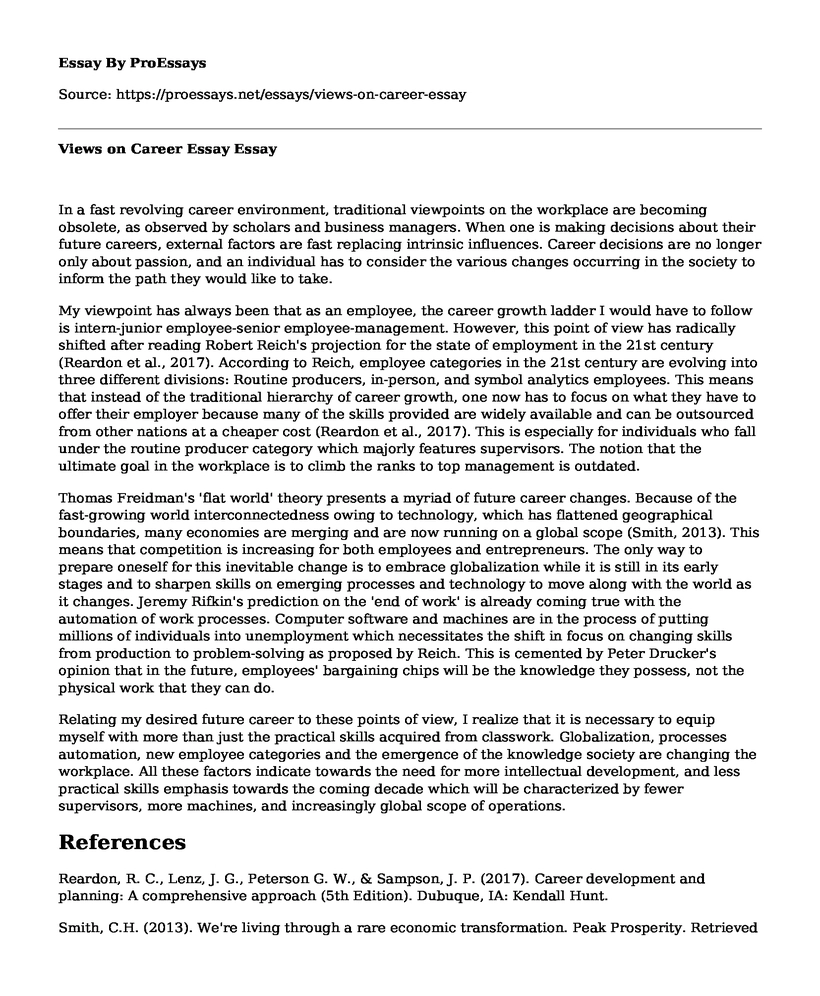In a fast revolving career environment, traditional viewpoints on the workplace are becoming obsolete, as observed by scholars and business managers. When one is making decisions about their future careers, external factors are fast replacing intrinsic influences. Career decisions are no longer only about passion, and an individual has to consider the various changes occurring in the society to inform the path they would like to take.
My viewpoint has always been that as an employee, the career growth ladder I would have to follow is intern-junior employee-senior employee-management. However, this point of view has radically shifted after reading Robert Reich's projection for the state of employment in the 21st century (Reardon et al., 2017). According to Reich, employee categories in the 21st century are evolving into three different divisions: Routine producers, in-person, and symbol analytics employees. This means that instead of the traditional hierarchy of career growth, one now has to focus on what they have to offer their employer because many of the skills provided are widely available and can be outsourced from other nations at a cheaper cost (Reardon et al., 2017). This is especially for individuals who fall under the routine producer category which majorly features supervisors. The notion that the ultimate goal in the workplace is to climb the ranks to top management is outdated.
Thomas Freidman's 'flat world' theory presents a myriad of future career changes. Because of the fast-growing world interconnectedness owing to technology, which has flattened geographical boundaries, many economies are merging and are now running on a global scope (Smith, 2013). This means that competition is increasing for both employees and entrepreneurs. The only way to prepare oneself for this inevitable change is to embrace globalization while it is still in its early stages and to sharpen skills on emerging processes and technology to move along with the world as it changes. Jeremy Rifkin's prediction on the 'end of work' is already coming true with the automation of work processes. Computer software and machines are in the process of putting millions of individuals into unemployment which necessitates the shift in focus on changing skills from production to problem-solving as proposed by Reich. This is cemented by Peter Drucker's opinion that in the future, employees' bargaining chips will be the knowledge they possess, not the physical work that they can do.
Relating my desired future career to these points of view, I realize that it is necessary to equip myself with more than just the practical skills acquired from classwork. Globalization, processes automation, new employee categories and the emergence of the knowledge society are changing the workplace. All these factors indicate towards the need for more intellectual development, and less practical skills emphasis towards the coming decade which will be characterized by fewer supervisors, more machines, and increasingly global scope of operations.
References
Reardon, R. C., Lenz, J. G., Peterson G. W., & Sampson, J. P. (2017). Career development and planning: A comprehensive approach (5th Edition). Dubuque, IA: Kendall Hunt.
Smith, C.H. (2013). We're living through a rare economic transformation. Peak Prosperity. Retrieved from www.peakprosperity.com>blog.
Cite this page
Views on Career Essay. (2022, Apr 15). Retrieved from https://proessays.net/essays/views-on-career-essay
If you are the original author of this essay and no longer wish to have it published on the ProEssays website, please click below to request its removal:
- Influence of Technology in Work-Life Balance Essay
- Implications of Employee Recruiting to Nursing Leaders Paper Example
- Professional Identity and Stewardship as a Neurosurgical Nursing Specialist Paper Example
- Essay Sample on Employee Monitoring: 21st Century Investment Strategy
- Essay Example on Leadership: Striking a Balance of Inclusivity in the Workplace
- Essay Example on Proper Decision Making: Vital for Enhancing Performance
- Sustainable Goal Research Paper Example







